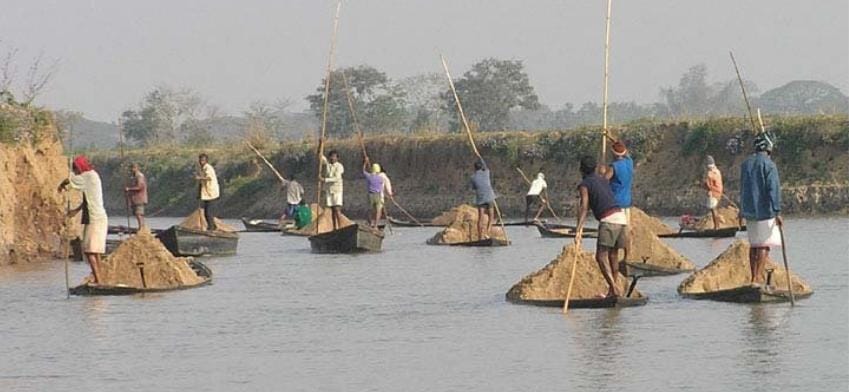Amidst the lush greenery of India’s northeast, more specifically, from the West Khasi hills of the ancient Shillong plateau originates the beautiful Kulsi river. It is a major tributary of the Brahmaputra and home to the National Aquatic Animal of India, the Gangetic River Dolphin. It is also the location of massive illegal sand mining in the state.
The Kuli River has been a source of livelihood to countless families and many generations residing on its humble banks. The Shillong Plateau had been a part of the larger Peninsular Plateau.
They have similar geological characteristics and have originated from the same geological processes. Pre Cambrian rocks comprise the Peninsular plateau. And even though they have developed differently after Garo-Rajmahal gap was created, rocks of Pre Cambrian origin are present in the Shillong Plateau.
It is for this very reason that the Kulsi River has the finest quality sand which is of Pre Cambrian origin. And the close proximity of the river to the metropolis of Guwahati makes it the easiest and cheapest source for sand mining. Construction activities of the city use this sand. This in turn doing is that it is slowly killing the river and the aquatic animals in the river. It is also essential for the surrounding ecology and landscapes connected to the river. Especially, the sensitive ecology of the very picturesque Chandubi lake. Because of its direct connection via a 2.5 km channel, the pristine wetland will be adversely.
If not stopped at the earliest, it is not long before what remains of the wetland is a grazing ground. The age old river and the vulnerable ecology of Chandubi lake urges us to do something about it. People visit Chandubi and admiring the reflections of the beautiful hillocks and blue sky on its waters. Many occasionally see dolphins jump in the Kulsi River. And for protectecting them, environmentalists are urging the authorities to do their best to save it’s beautiful ecology. This delicate ecosystem is urging us to listen to the call of our souls and come forward and take action.
Spread awareness, support conservation efforts and let the word reach far and wide. Here is how you can start with a click.
Priti Sikha Thakuria contributed this writeup to Discover East. Also,she is experienced in community engagement for social impact, including teaching children through Progotixil’s Kuhipaat initiative. She is working as a researcher with ‘There is No Earth B’ at the helm of the Save Chandubi Project.
Feature Image Source: Researchgate.net.

